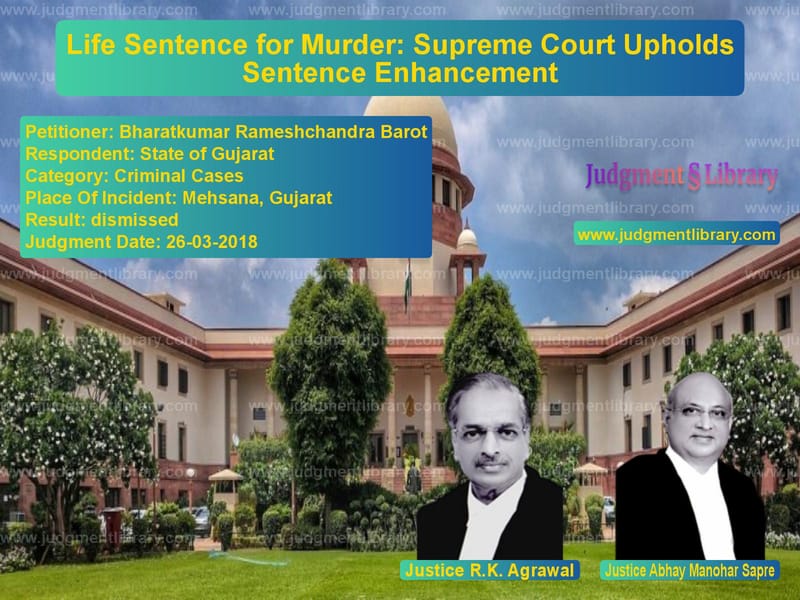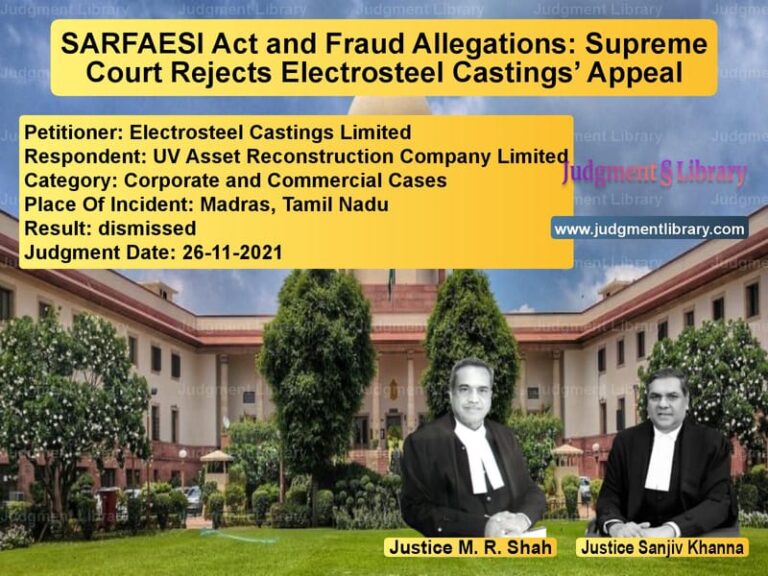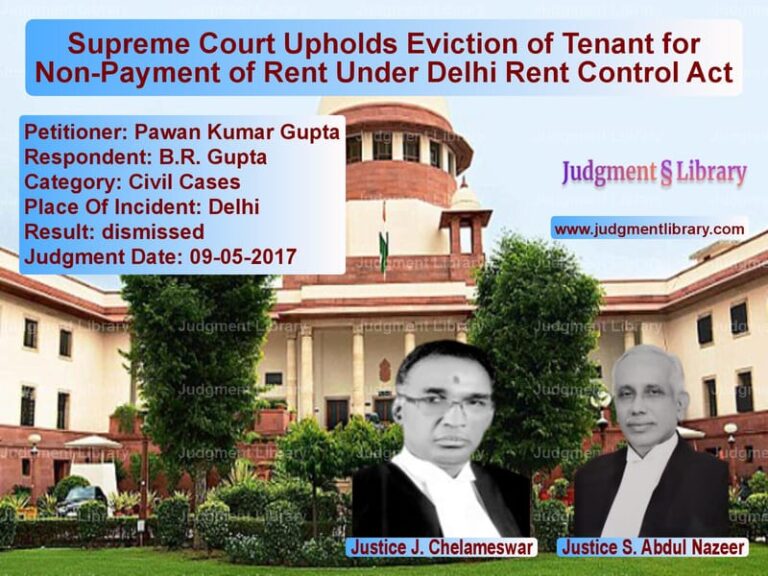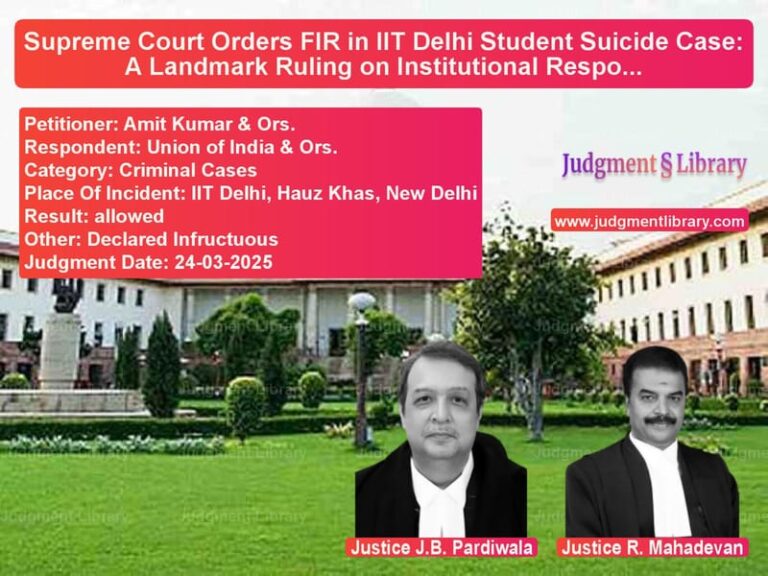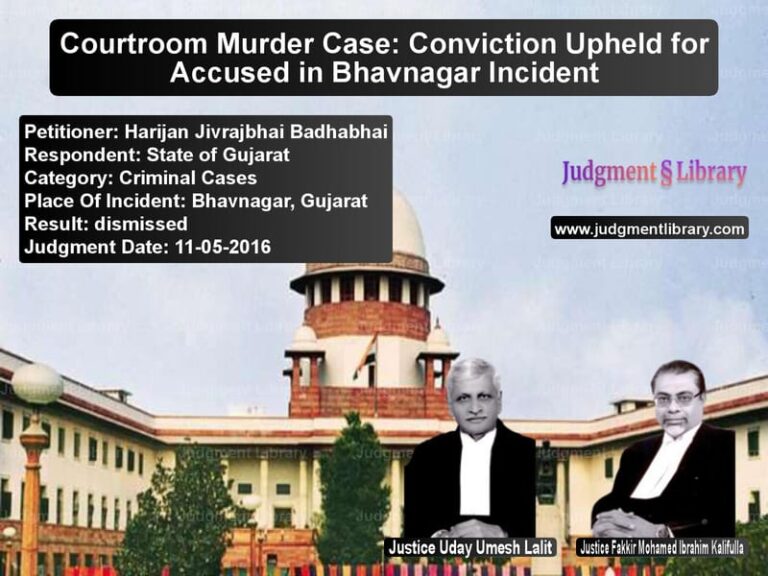Life Sentence for Murder: Supreme Court Upholds Sentence Enhancement
The Supreme Court of India, in the case of Bharatkumar Rameshchandra Barot v. State of Gujarat, addressed the legal question of whether a sentence of ten years’ rigorous imprisonment for murder under Section 302 of the Indian Penal Code (IPC) could be enhanced to life imprisonment. The case raised significant questions regarding sentencing discretion, the right to a fair hearing, and the application of Section 377 of the Code of Criminal Procedure (CrPC).
Background of the Case
The appellant, Bharatkumar Rameshchandra Barot, was convicted for the murder of Dilipbhai Ratnaji under Section 302 of the IPC and for an offense under Section 135 of the Bombay Police Act. The Sessions Court in Mehsana, Gujarat, sentenced him to ten years’ rigorous imprisonment for the murder charge along with a fine of Rs. 5,000. Additionally, he was sentenced to three months’ simple imprisonment for the offense under Section 135 of the Bombay Police Act.
The State of Gujarat, dissatisfied with the lesser punishment awarded, appealed before the Gujarat High Court under Section 377 of the CrPC, seeking an enhancement of the sentence. The High Court allowed the appeal and modified the sentence, increasing it from ten years of rigorous imprisonment to life imprisonment as mandated under Section 302 of the IPC.
Aggrieved by the enhancement, the appellant approached the Supreme Court, contending that he was denied an opportunity to defend himself adequately in the High Court proceedings.
Arguments Before the Supreme Court
Petitioner’s (Appellant’s) Arguments
Represented by his counsel, the appellant raised the following key points:
- The High Court failed to provide an adequate opportunity for him to defend himself against the enhancement of the sentence.
- Under Section 377(3) of the CrPC, an accused has the right to not only oppose an enhancement appeal but also challenge his conviction, which he was deprived of.
- The appointed amicus curiae did not have sufficient time to prepare and present his defense properly.
- The enhancement of the sentence without a proper hearing violated the principles of natural justice.
Respondent’s (State of Gujarat’s) Arguments
The counsel for the State of Gujarat countered these claims, arguing:
- The appellant was duly served with notice of the appeal, yet he chose not to appear or contest it.
- The High Court had taken adequate measures by appointing an amicus curiae to defend the appellant’s interests, ensuring fairness.
- The sentence originally imposed by the Sessions Court was contrary to the mandatory provisions of Section 302 IPC, which prescribes either life imprisonment or the death penalty.
- The High Court, therefore, had no option but to rectify the sentencing error made by the Sessions Court.
Supreme Court’s Analysis and Judgment
The Supreme Court, comprising Justices R.K. Agrawal and Abhay Manohar Sapre, carefully examined the procedural fairness and legal correctness of the High Court’s ruling. The Court made the following key observations:
Compliance with Section 377(3) of the CrPC
The Court addressed the appellant’s claim that he was denied a fair hearing:
“The High Court ensured compliance with Section 377(3) of the Code by serving a dasti notice to the appellant. The appellant did not appear despite service, nor did he file an appeal challenging his conviction. In such a situation, the High Court was justified in appointing an amicus curiae to safeguard the appellant’s interest and assist the Court.”
The Court further noted that the amicus curiae had never complained about inadequate time for preparation during the High Court proceedings. The claim of prejudice due to insufficient time was, therefore, deemed without merit.
Legality of Sentence Enhancement
The Supreme Court found the Sessions Court’s sentencing decision to be legally unsustainable. It ruled:
“Once the Sessions Judge found the appellant guilty of murder under Section 302 IPC, the only punishment that can be awarded in law is either the death penalty or life imprisonment along with a fine. Any punishment less than life imprisonment is per se illegal and without authority of law.”
The Court emphasized that sentencing under Section 302 IPC is not discretionary. A sentence of ten years’ imprisonment is not an option, and the High Court was right in rectifying this error.
Key Takeaways from the Judgment
- The Supreme Court upheld the principle that when an appeal for sentence enhancement is filed, the accused must be given an opportunity to defend himself.
- The accused in this case was duly notified and given an opportunity to defend himself but chose not to contest the appeal.
- The punishment for murder under Section 302 IPC must be either life imprisonment or the death penalty. A ten-year sentence is not legally permissible.
- The High Court acted within its jurisdiction by enhancing the sentence to life imprisonment, ensuring compliance with the law.
Conclusion
The Supreme Court dismissed the appellant’s appeal, upholding the Gujarat High Court’s decision to enhance the sentence to life imprisonment. It reaffirmed that courts must adhere strictly to statutory sentencing requirements under Section 302 IPC. The ruling serves as an important precedent in ensuring that judicial discretion in sentencing aligns with the law.
By reinforcing the mandatory nature of sentencing under Section 302 IPC, the Supreme Court has underscored the necessity of judicial adherence to established legal provisions while ensuring that fair trial principles are observed in appeals for sentence enhancement.
Petitioner Name: Bharatkumar Rameshchandra BarotRespondent Name: State of GujaratJudgment By: Justice R.K. Agrawal, Justice Abhay Manohar SaprePlace Of Incident: Mehsana, GujaratJudgment Date: 26-03-2018
Don’t miss out on the full details! Download the complete judgment in PDF format below and gain valuable insights instantly!
Download Judgment: Bharatkumar Rameshch vs State of Gujarat Supreme Court of India Judgment Dated 26-03-2018.pdf
Direct Downlaod Judgment: Direct downlaod this Judgment
See all petitions in Murder Cases
See all petitions in Bail and Anticipatory Bail
See all petitions in Judgment by R K Agrawal
See all petitions in Judgment by Abhay Manohar Sapre
See all petitions in dismissed
See all petitions in supreme court of India judgments March 2018
See all petitions in 2018 judgments
See all posts in Criminal Cases Category
See all allowed petitions in Criminal Cases Category
See all Dismissed petitions in Criminal Cases Category
See all partially allowed petitions in Criminal Cases Category

